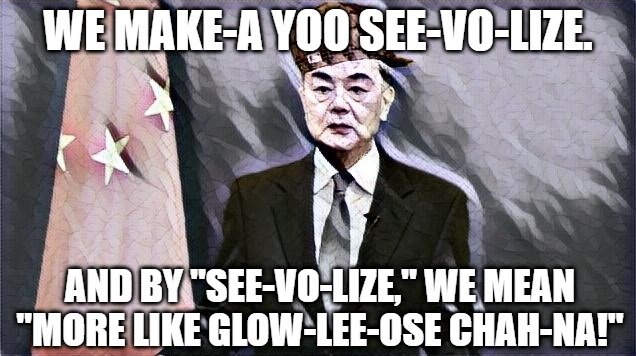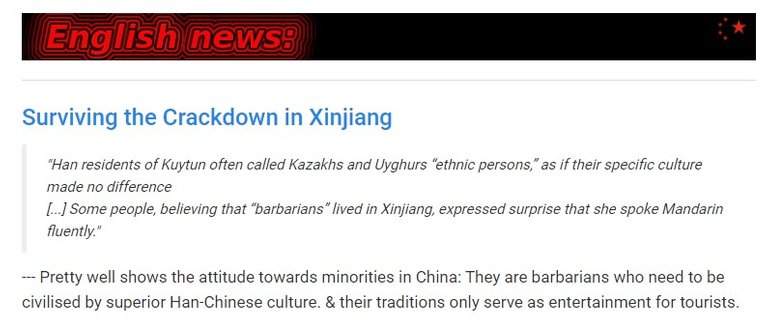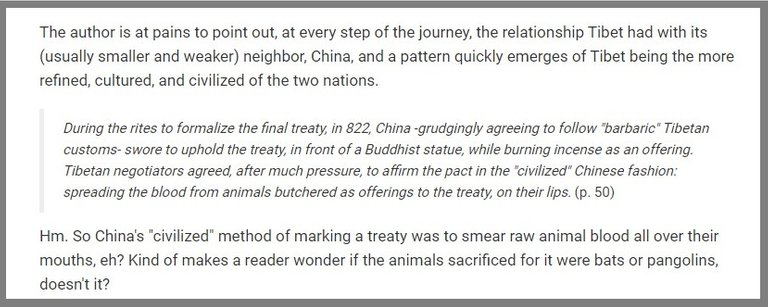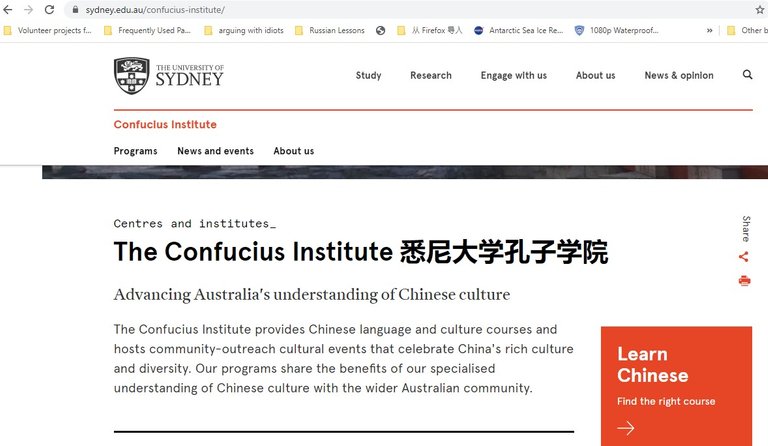
The Chinavangelists
Ah, the Confucius Institute. Where else is the incurable ethnonarcissism, the messianic delusion of Nietcszhian "Master Race" status that underpins China's entire... let's say "civilization" for lack of a better word, on more glorious and vivid display than it is with these wannabe missionaries of the "Holy Church of Han Chauvinism?"
Canada was one of the first to recognize that the Confucius Institute may not be as benign as China claims, though they underestimated the scope of the problem (York). And the number of countries who have begun to look askance at this organization has grown exponentially in recent years as its Beijing puppeteers have begun to use it as a tool to export China's academic censorship to cooperating universities (Przychodniak). Australia has found reason to believe these institutes are spy nests (Burton-Bradley), and even Germany, whose chancellor has bent over backwards (or into any other position Xi wanted her in) to appease the self-anointed "Celestial Empire" at every juncture, has finally run out of excuses to make for this Chinese propaganda front (Huang).
And of course, among the myriad of "it's about damned time" moments of the Maoist Struggle Session I had the pleasure of watching China endure at the unforgiving hands of the Trump Administration, was when the US State Department finally declared the Confucius Institute to be a Foreign Mission, something it has openly boasted of being from the very beginning (Pamuk & Brunnstrom). While it's good that these nations are finally recognizing that the Confucius Institute is more sinister than what it claims to be, the elephant in the room is what the Confucius Institute claims to be is sinister enough in itself. To see why, one must examine the culture that spawned it, and what the symbolism in its name has been from the very beginning.
"Other Cultures?" What are Those?
It seems almost redundant at this point to speak of the ethnocentrism that forms the core of China's entire cultural identity, but this, once again, is where I must begin. Sources everywhere have essentially conceded this point.
The Sino-centrism that shaped Chang'an's dealings with foreigners had deep roots... China was the only literate "civilized" society to emerge in relative isolation. Civilizations as diverse as the Indus, the Euphrates, and those of ancient Egypt, Rome, and Greece developed in the company of at least one literate sibling... This indelibly marked the Chinese. All non-Chinese were considered "barbarian." (Laird, p. 45, emphasis mine)
There was no cognizance of any other culture comparable to Chinese culture, at whose territorial frontier Chinese cultural assimilation must stop... There was no concept of Chinese culture and other cultures, only Chinese culture or no culture at all. (Smith, p. 22, emphasis mine)
This is traditionally known as "the Xia/Yi distinction," with "Xia" being the Chinese word for "Chinese" and "Yi" meaning "barbarian." Note the absence of any other category. Smith goes on to cite the American Asia-Scholar Owen Lattimore by explaining the way China defined this distinction between the "Chinese" and the "barbarians."
The basis of the difference between the Hans and the Barbarians was not originally of an ethnic nature, but rested on a relationship to Civization [as China defined it], since for the Chinese there is [Sinic] Civilization and the Void. (Lattimore, p. 475)
So there it is. And lest it should be said that this is merely a "biased, Western view" held by "hostile anti-China forces," as the Party loves to claim whenever they are criticized, China's own government-approved sources echo this view of a "barbarian" world needing to be elevated from barbarianism by becoming members of the "Celestial Empire."
The Han people living in central China had an advanced level of civilization, while the minority ethnic groups were not as advanced. The Huaxia nation had gradually developed the idea to judge people by their civilized character and etiquette. (Shi & Chen, p. 57, emphasis mine)
And of course, refer to the above citations and recall China's definition of "civilization" has always been limited to "civilized = Human = us; barbarians = less than Human = everyone else." This same book goes on to hint at what the Han have historically felt needed to be done to "help" those poor, helpless souls who had the misfortune of not being born Chinese (1), all in glorious Chinglish of course.
People who are fit the standards of the Huaxia the civilization and etiquette were considered civilized, while the people who are not fit the form were considered uncivilized, which became known as "Discrimination between the Civilized and the Uncivilized. (ibid, emphasis mine)
The Historian Pan Yihong (of Chinese descent, by the way) declares it with less subtlety.
The biases in the Chinese accounts of foreign countries are obvious. It was assumed that Chinese culture was superior, and therefore all non-Chinese are referred to as “barbarians” who have to be transformed by Chinese civilization. Nomadic peoples are constantly described as having human faces but animal hearts, as being greedy and unrestrained in their behavior, incapable of understanding reason—as “monkeys wearing hats,” or “dwarf-slaves.” (Pan, p. 11, emphasis mine)
So here we come to the crux of the matter. Having already WELL-established, to the point of beating a now-very-dead horse, that China's entire national identity is predicated upon a cultural superiority complex (though I would disagree with Lattimore and say it is rather blatantly Han Ethnosupremacist in nature, at least in modern history), we now come to how that superiority complex has impacted China's foreign policy for millennia, which was best summarized by Smith.
Thus, a foreigner or barbarian is actually or potentially a feudatory and, once a fuedatory, then eventually assimilated to Chinese culture. "Foreign" in Chinese thus does not mean "non-Chinese" but "not yet Chinese." (p. 23, emphasis mine)
At the height of America's hubris, the so-called "Manifest Destiny" era, our most jingoistic hardliners could not have come up with anything this arrogant on their best day. I have long been at pains to find just the right way to explain China's attitude toward the rest of the world to those who have never been to China and witnessed it. As it turns out another blogger here on Hive, recently did it for me.

Thank you, @bossel, for distilling it down to such a succinct and non-nonsense sentence, and you're exactly right with one minor caveat. This is not China's view of the ethnic minorities within China, but of ALL non-Chinese in the world. Every central government that has ever existed in the land we now call "China (notwithstanding the fallacy of failing to recognize each dynasty was actually a separate country entirely)," has viewed their expansionism and imperialism in the same light that an evangelist views missionary work, a sort of mission civilsatrice: transforming a "backward" and "dark" world by bathing them in the "glorious light" of China's "superior" culture, and eventually assimilating them, whether they want it or not.
Hmm... "You will be assimilated. Resistance is Futile." Where have I heard such locution before? (2)

I digress.
The point is, the Chinese have a long-standing tradition of using the same institution as their means of "civilizing (read 'Sinicizing')" their neighbors: Chinese schools.
If You Can't Beat Them, Get Them to Join You
For a very long period, U.S. imperialism laid greater stress than other imperialist countries on activities in the sphere of spiritual aggression, extending from religious to "philanthropic" and cultural undertakings. According to certain statistics, the investments of U.S. missionary and "philanthropic" organizations in China totalled 41,900,000 U.S. dollars, and 14.7 per cent of the assets of the missionary organizations were in medical service, 38.2 per cent in education and 47.1 per cent in religious activities. Many well-known educational institutions in China, such as Yenching University, Peking Union Medical College, the Huei Wen Academies, St. John's University, the University of Nanking, Soochow University, Hangchow Christian College, Hsiangya Medical School, West China Union University and Lingnan University, were established by Americans. (Mao Zedong, "Friendship or Aggression," 1949)
The nerve of these Americans... How dare they?!
Sarcasm aside, Mao doubled down on this virtiolic tirade, dropping all implication or subtlety and explicitly referring to America's establishment of universities in China (including Tsinghua, the only semi-reputable university in the entire country to-date), as "for purposes of spiritual aggression."
"What," one might ask, "was he so furious about?" After all, all the Americans wanted was to help give Chinese students an opportunity for a better future, made possible by more advanced science studies available in American universities. Even China has acknowledged this. What was there to be upset about?
A lot, it turns out. At least, if you think like a Han Supremacist.
This meant a shift from the military policy of the Ch'in [Qin] to a policy of reliance upon the virtue of China to attract and transform the barbarians. This policy was neccessitated by an early defeat of Han armies. (Smith, p. 26)
Schools were opened by the Hans for the children of the local aristocracy, with the Imperial Treasury taking over responsibility for paying the costs of schooling. To oblige these children to attend these schools, it was laid down that the post of [governor] could only be inherited by someone, male or female, educated in a Chinese school. (Chaliand, p. 81)
In China's mind, establishing your own schools in another country is an expression of power over that country! China's method of dealing with adversaries they can't beat militarily (which, for the past few centuries, has been basically anyone) is to feign friendship, shower them with gifts, and then slowly take over their schools. Once this was done, China could ensure that their version of history could be taught, that their worldview, rather than an objective one, would be instilled into the students. In this way, they determined what the children of their enemies believed, and made the next generation vassals to China.
In truth, it's a cunningly simplistic strategy. Whoever controls the narrative taught in schools, effectively owns history. If a group of people in their entirety can be taught to believe, and if all evidence of any other history can be destroyed, how can the new, false history be disproven? China has a saying for this. "History is a maiden. You can dress her up however you wish." Ergo, whoever controls the schools, decides what did and didn't happen in the past. This is one of the primary reasons China's leaders grind their teeth perpetually about the number of international schools that exist in China.
This is not accidental either. China recognizes the imperialist value of "you won't teach your children. We will." Nor is it only ancient history. This "we will build schools designed to make you more like us, for which we expect you to be grateful" spiel is a common weapon in China's playbook today. Jamyang Norbu elaborates on both the policy of imposing Chinese schools, and the Chinese "we're here to civilize you, because we know everyone in the world wants to be more Chinese, right?" mindset behind them, extensively in Warriors of Tibet.
One day around the middle of 1955 I was summoned by Trou the Commissar. He offered me a cigarette and informed me I had been granted a scholarship to study at the South-West School for National Minorities in Chengtu, China... "You do not realise what a marvellous opportunity this is," argues Trou impatiently. "You will have the chance to study Marxism properly and also to brush up on your Chinese." (p. 89)
From 1951 the Chinese had made it mandatory for every district to send at least fifty people annually to China for studies. They insisted the students should be young boys and girls. (p. 90)
What follows is an entire chapter of browbeating wherein students were "taught" how their entire culture was backward and only the "glorious light of Mao and the advanced Han" could save the poor, savage non-Chinese from their backward selves. Norbu is not the only one to observe this use of schools as a tool for forcibly brainwashing students into believing China's false historical narrative and delusions of superiority.
I met a Tibetan in Lhasa... in 1968. He grew up in a tiny village outside of Lhasa and never travelled in his youth. He was just a farmer. It was during the Cultural Revolution, and everything about his life was controlled by the Chinese when he was growing up; his school, where he was taught in Chinese, the history he was taught there... he said he had been taught to think of himself and his people as barbarians by his teachers from Coastal China. (Laird, p. 177-178)
Zheng Qian's contribution to China Intercontinental Press's "Sinopedia" series, China's Ethnic Groups and Religions, devotes pages 113 to 120 to boasting of these "ethnic schools," taking pride in both their racially segregated nature and the fact that Han culture is superimposed over the "less advanced (read 'non-Chinese')" culture of the students and their parents, and Smith (p. 371) cites a litany of interviews with Tibetan students who were brought to the brink of suicide by the overbearingly Han Supremacist version of history being taught at these schools, echoing Norbu's account.
In summary, in the Chinese mind, the act of opening schools to teach the "correct (read 'favorable to China')" version of history and teach students to revere China, is an expression of China's deeply ingrained superiority complex, and their visceral reaction to any foreign-led educational institutions on their own soil proves that this is not subconscious but openly known.
Now, then, here is where the point comes home.
What Is the Exact, Openly Stated Purpose of the Confucius Institute?
This is the home page of the University of Sydney's Confucius Institute (in case you couldn't gather that from the picture). Look at the openly stated goals. Listen to the phrasing.
"Language and culture courses."
"Celebrate China's rich culture."
"Share the benefits of our specialised understanding of Chinese culture."
This is riddled with the same "everyone wants to shed their 'backward and barbaric' non-Chinese culture and become more like the Great and Glorious Han" rhetoric that has underpinned all the above examples, but never mind.
On the surface, what's wrong with teaching Chinese culture? A comparison could be drawn (and the Chinese government loves to draw it) to the Goethe Institute, or the British Council. What's wrong with a cultural exchange program? Especially when it comes with so much funding?
Let's recall the words of Smith from earlier. "There was no concept of Chinese culture and other cultures, only Chinese culture or no culture at all." This "exchange" is purely a one-way street, and it's an aggressive one, from a nation whose foreign policy for millennia has been built on the belief in a "Mandate from Heaven" to "embrace all the 'barbarians' under Heaven into the arms of Chinese Civilization (Yu, 77)." And of course, like everything related to China, there are, as Glenn Anthony May put it, "visible strings attached."
Some of the strings can be seen in the memoranda of understanding that US universities conclude with Hanban. Among other things, they must state their support for the "one China policy" – the decades-old US policy of not recognizing the legitimacy of the Republic of China on Taiwan... Hanban, for obvious reasons, wants no such discussion to occur... But it's not just Taiwan that receives special treatment. Two other "T" words are anathema to Beijing, and hence to Hanban: Tibet and Tiananmen. Don't expect any universities with CIs to arrange a visit of the Dalai Lama anytime soon or to schedule a symposium on the Tiananmen Square massacre of 1989. In Canada last year, during riots in Tibet, the head of a Confucius Institute at the University of Waterloo succeeded in reversing the direction of coverage and getting a major Canadian television station to apologize for its previous pro-rebel coverage.
Other issues are verboten – China's treatment of the recent Nobel laureate Liu Xiaobo and other human rights activists, China's military buildup, China's currency manipulation, China's appalling environmental record, China's crackdown on the Falun Gong and so on. Hanban wants to paint a portrait of China without any unsightly wrinkles. As one scholar puts it, the People's Republic is intent on emphasizing "happy news."
In the academy, we have words to describe this approach to community education and public discussion. "Propagandizing" is one word; "censorship" is another.
Frankly, the list of documented cases of the Confucius Institute not even bothering to mask its role as the Chinese Government's tool for extending its censorship apparatus abroad through threats, are so numerous I won't bother listing them all here. Let me simply say, while I don't normally like to use Wikipedia as a source, its article on this particular topic is well sourced, so readers who doubt the veracity of the information (or who are arguing with some belligerent wumao calling it "lies and Western propaganda," as they do to anything not favorable to China) can check the citations for themselves. Just as you can with my blog. (wink)
In short, it is an international version of the "ethnic schools" created to make Tibetans, Uighurs, and thousands of years of other non-Chinese before them, into broken, contrite slaves who hate themselves for the ethnicity they were born into, and for the nation whose citizenship they hold, while holding third-world China up as some kind of "light of the world." And you know what? They're doing it right out in the open.
And they expect us to be grateful for this.
Open your eyes, world. China is not even bothering to hide what they think of you anymore, or what they're doing.
(1) The twofold irony of this claim is that not only have I already commented on the backward and breathtakingly barbaric behavior exhibited by the supposedly "Civilized" Chinese, but so did the Tang historians themselves.

(2) If the shudder-inducing Star Trek parallels here were not already rampant enough, I wish I still had my copy of the propaganda text on China's ethnic minority policy I left in my apartment in Beijing, so I could take a photo of the page that actually boasted, in glowing terms, of how the Central government "added these minorities' cultural distinctiveness to China's own," in those exact words. I can only presume their propagandists are not as well-versed in Western pop-culture as they'd like to think, to commit such a faux-pas.
Works Cited
Bossel. "China News Roundup / Nachrichten 2021-04-04/05." Peakd. 4 Apr, 2021. Web. 16 Apr, 2021. https://peakd.com/china/@bossel/china-news-roundup-nachrichten-2021-414c6f736804a#@bossel/re-patriamreminisci-2021412t22059821z
Burton-Bradley, Robert. "China's Confucius Institutes Have Spy Agencies and Governments Increasingly Alarmed." Australian Broadcasting Company. 9 Mar, 2019. Web. 8 Apr, 2021. https://www.abc.net.au/news/2019-03-10/confucius-influence-around-the-world-in-question/10875960
Cao Dawei & Sun Yanjing. Trans. Xiao Ying, Li Li & He Yunzhao. China's History. Beijing, 2010. China Intercontinental Press.
ISBN 978-7-5085-1302-7
Chaliand, Gerald. Minority Peoples in the Age of Nation States. London, 1989. Pluto Press.
ISBN 978-0-745-3028-67
Huang Tzu-ti. "German Universities Move to Reject China’s Confucius Institutes." Taiwan News. 28 Jul, 2021. Web. 13 Apr, 2021. https://www.taiwannews.com.tw/en/news/3975526
Laird, Thomas. The Story of Tibet - Conversations With the Dalia Lama. New York, 2006. Grove Press.
ISBN 978-0-8021-4327-3
Lattimore, Owen. "An Inner Asian Approach to the Historiological Geography of China," in Studies in Frontier History - Collected papers, 1928-1958. London, 1962. Oxford University Press
ISBN 978-0758-169-617
Cited in Smith, 20 & 21
Mao Zedong. "Friendship or Aggression." 1949.
archived on Marxists.org. "Selected Works of Mao Zedong." Web. 15 Apr, 2021. https://www.marxists.org/reference/archive/mao/selected-works/volume-4/mswv4_69.htm
May, Glenn Anthony. "Confucius on the Campus." Asia Sentinel. Archived on Wayback Machine. 4 Mar, 2011. From Archive. 16 Apr, 2021. https://web.archive.org/web/20110903210024/http://www.asiasentinel.com/index.php?option=com_content&task=view&id=3035&Itemid=206
Norbu, Jamyang. Warriors of Tibet - The Story of Aten and the Khampas Fight for the Freedom of Their Country. London, 1986. Wisdom Books.
ISBN 978-0861-710-508
Pamuk, Humeyra & Brunnstrom, David. "U.S. Requires Confucius Institute Center to Register as Foreign Mission." Reuters. 13 Aug, 2020. Web. 8 Apr, 2021. https://www.reuters.com/article/us-usa-china-confucius-idUSKCN2592BW
Pan, Yihong. Son of Heaven and Heavenly Qaghan: Sui-Tang China and its Neighbors (1997). Western Washington University. East Asian Studies Press. 6.
https://cedar.wwu.edu/easpress/6
Przychodniak, Marcin. "Confucius Institutes: A Tool for Promoting China’s Interests." China Observers In Central Europe (Ch.O.I.C.E.). 8 May, 2019. Web. 4 Apr, 2021. https://chinaobservers.eu/confucius-institutes-as-a-tool-for-promoting-chinas-interests/
Shi Zhongwen & Chen Qiaosheng. Trans. Wang Guozheng. China's Culture. Beijing, 2010. China Intercontinental Press.
ISBN 978-7-5085-1298-3
Smith, Warren. Tibetan Nation - A History of Tibetan Nationalism and Sino-Tibetan Relations. 1996, Boulder. Westview Press.
ISBN 978-0-813-332-802
York, Geoffrey. "Beijing uses Confucius to lead charm offensive." The Globe and Mail. 9 Sep, 2005. Web. 13 Apr, 2021. https://www.theglobeandmail.com/news/national/beijing-uses-confucius-to-lead-charm-offensive/article986321/
Yu Yingshi. Trade and Expansion in Han China. Berkeley, 1967. University of California Press.
ISBN 978-052-0327-955
Zheng Qian. Trans. Hou Xiaocui, Rong Xueqin & Huang Ying. China's Ethnic Groups and Religions. Beijing, 2010. China Intercontinental Press.

Thanks for mentioning me, but it's a small 'b', else I don't get the notification.
"China is not even bothering to hide what they think of you anymore, or what they're doing."
& we should thank emperor Xi for this. That's helping to wake up the world, if we are lucky, just in time.
An idea for another article would perhaps be a juxtaposition of the inferiority complex towards Europeans & US Americans which runs parallel to the superiority complex in Chinese society. At the same time that they see themselves as civilisationally superior they grudgingly have to admit the technological & economical advantages of the West. Had some funny conversations with Chinese in that regard.
I'll correct the capitalization right away. In a similar vein to what you're saying, a Chinese... eh, "acquaintance," -I won't call this snake a friend- once told me "we've never understood the way you Americans do propaganda. Why would you go out of your way to make yourselves look weaker? Why would you spend so much money running documentaries about how badly your scholars hate themselves and their country? I've never seen a hegemon with an inferiority complex."
It would make for an interesting article but frankly, I feel like it would require more time and research than can be justifiably poured into a single Hive entry. It would almost be a Masters Thesis.
Yeah, well, you put a lot of effort into your articles with all the footnotes, anyway. Not sure whether the few readers here on Hive make it worthwhile. You should think about additional publishing opportunities, maybe even put your texts together as an ebook on Amazon or Gumroad.
I have actually thought of cobbling a lot of my entries here into an e-Book. I'd have to make sure I'm not breaking copyright somehow by having them here while they're published under a publisher's label or something like that.
Hmm, I have a hard time understanding your article. From my point of view, I think the current Chinese claim the superiority of Chinese civilization because of their antipathy against the reality that Western civilization dominates the world.
That's China's claim as well.
But my point is to say this is not China's "response" to Western "cultural domination." In fact, they have ALWAYS held this view of their own superiority, they have ALWAYS used "Chinese culture schools" as a way of taking over other nations, and they have ALWAYS believed the nations being taken over should thank them for this (because they replaced the 'backward, barbaric' non-Chinese culture with their own 'superior' Chinese culture).
The examples of this go from millennia ago, up to the present day.
And if there was any doubt that China uses this as a tool of control, here is an example of even China's foreign collaborators rather openly threatening a host university for daring to question China.
https://williamyang-35700.medium.com/slovak-director-of-a-confucius-institute-has-been-fired-after-sending-threatening-emails-to-local-819603878a3c